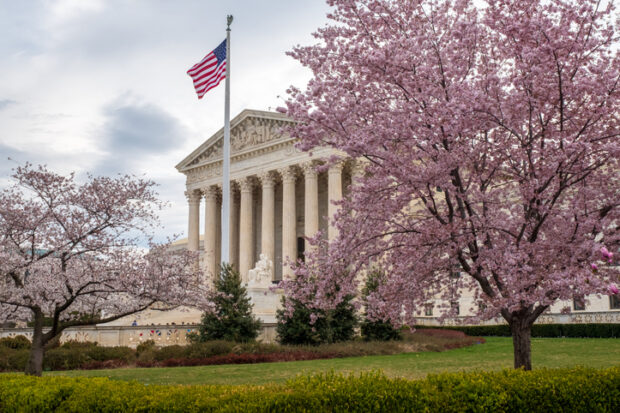
The good news is that the Supreme Court took its self-imposed, entirely toothless ethical code seriously and multiple justices recused themselves from a major copyright case implicating publishers paying them hefty sums for their books. The bad news is… apparently the Supreme Court just can’t hear major copyright cases because they have too many conflicts of interest with publishers paying them hefty sums for their books.
It would be ideal if the justice system could successfully resolve intellectual property disputes, right?
The case is Baker v. Coates, where author Ralph Baker alleged that fellow author Ta-Nehisi Coates plagiarized from Baker’s Stock Exchange in Coates’s The Water Dancer. As part of the lawsuit, Baker named a hodgepodge of media entities as defendants from Oprah to Disney to MGM to Apple. At a certain point, a caption populated with deep pockets creates potential conflicts.
24-6839, BAKER, RALPH W. V. COATES, TA-NEHISI, ET AL.: Because the Court lacks a quorum, 28 U. S. C. §1, and since the qualified Justices are of the opinion that the case cannot be heard and determined at the next Term of the Court, the judgment is affirmed under 28 U. S. C. §2109, which provides that under these circumstances “the court shall enter its order affirming the judgment of the court from which the case was brought for review with the same effect as upon affirmance by an equally divided court.” Justice Alito, Justice Sotomayor, Justice Gorsuch, Justice Barrett, and Justice Jackson took no part in the consideration or decision of this petition.
As Fix the Court notes, four of the six recusing justices have had or will have books published by Penguin Random House, a subsidiary of a media conglomerate called Bertelsmann, a named defendant. Justices Sotomayor, Gorsuch, Barrett, and Jackson have books with Penguin. The fact that the Supreme Court’s weak ethical guidelines don’t require justices to explain their recusals — even if it intended to inspire that sort of transparency — it’s not immediately clear what prompted Alito to recuse himself.
Fix the Court searched the records and can’t see an obvious reason:
As far as the Justice Alito recusal goes, it’s unclear at the moment as to the reason why. It’s possible he bought stock of late in one of the parties or in one of their parent companies (e.g., Apple, Amazon, Warner Bros.), but on the other hand, he has been up-to-date with his PTRs (see this one from earlier in May), and there are no new stock purchases listed in the database (see the old ones here).
But still, it should be a problem that the highest court in the land is paralyzed in the face of major media conglomerates. Given that antitrust hasn’t done a particularly good job of policing the media space, these conflicts will only deepen as long justices keep writing books.
And why DO we have justices constantly writing books while still serving the public? It’s a function of paying a public servant salary while allowing aristocratic role. In a normal job where the public trust might be implicated, an official might wait until they retire to cash in on big money book deal. But when life tenure transformed from “insulation from partisan whims” to “confirmation-to-grave job security,” the justices stopped envisioning a memoir-fueled retirement at a reasonable age and decided to start writing early and often as a salary supplement.
You know, just spitballing here, but imposing “term limits” on the Supreme Court — which would not be actual term limits but more like mandatory senior status, limiting the justice’s role on the Supreme Court’s active panel freeing them to ride circuit — would create a stable of former justices who could be drawn upon to fill in for recusals and also alleviate the pressure on justices to accept book deals while serving on the Court because they’d have a definite, imposed light at the end of the tunnel to write their defense of their record. That might give us back a Supreme Court capable of adjudicating ALL the cases that merit its attention instead of falling apart like a Jenga tower whenever five of them want to renovate their kitchen with banal musings about abstention doctrine.
But, sure, let’s just accept this short-term step forward in judicial ethics and kick bigger reform further down the road. It’s only been a couple hundred years, why rush?
 Joe Patrice is a senior editor at Above the Law and co-host of Thinking Like A Lawyer. Feel free to email any tips, questions, or comments. Follow him on Twitter or Bluesky if you’re interested in law, politics, and a healthy dose of college sports news. Joe also serves as a Managing Director at RPN Executive Search.
Joe Patrice is a senior editor at Above the Law and co-host of Thinking Like A Lawyer. Feel free to email any tips, questions, or comments. Follow him on Twitter or Bluesky if you’re interested in law, politics, and a healthy dose of college sports news. Joe also serves as a Managing Director at RPN Executive Search.
The post Basic Ethics Breaks Supreme Court Because Too Many Justices Have Book Deals appeared first on Above the Law.
